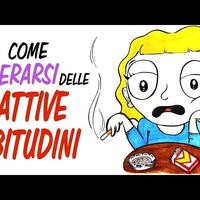Come LIBERARSI scientificamente delle CATTIVE ABITUDINI
Tutti noi abbiamo delle abitudini che vorremmo abbandonare.
c'è chi si morde le unghie, chi fuma o chi mangia a tarda notte.
ma .. perché è così difficile liberarsene?
Forse pensiamo che la nostra giornata sia costituita da una serie di decisioni consapevoli,
ma in realtà, uno studio della Duke University ha dimostrato che il 45% dei comportamenti
quotidiani è composto da azioni che si ripetono ogni giorno
e che tendiamo a compiere nello stesso modo.
Queste sono le nostre abitudini.
Le abitudini sono attribuite a una delle strutture più primitive del nostro cervello:
i Gangli della base, la stessa regione che ci aiuta a controllare processi come la respirazione
e la deglutizione.
Vediamo qui un esperimento del MIT: un topo è seduto davanti a un cancello di un labirinto
a forma di T, dove sul lato sinistro è presente un pezzo di cioccolato.
Quando la porta scatta, il topo esplora il labirinto, annusando e grattando le pareti.
In primo luogo esplora il lato destro e poi quello sinistro, trovando infine il cioccolato.
Una scansione dei suoi gangli basali mostra che stanno lavorando duramente durante l'intero
processo.
Tuttavia dopo una settimana di allenamento, vediamo che il topo corre immediatamente verso
il cioccolato una volta che il cancello scatta.
A questo punto, c'è pochissima attività cerebrale una volta che il cancello è aperto
e il cervello si attiva maggiormente solo una volta raggiunto il cioccolato.
Il nostro cervello cerca di minimizzare lo sforzo e la distanza da percorrere, e questo
il tipo di comportamento automatico del cervello viene chiamato "Chunking".
Esso aiuta a creare delle nuove abitudini nelle cellule del cervello.
È come un'attività che fai ogni giorno a cui non devi più pensare
- spazzolare i denti o uscire in automobile dal garage -
cose che una volta erano difficili da fare, ma che ora sono diventate automatiche.
Questo processo è composto da un ciclo a tre fasi.
La prima fase è il segnale che per il topo è il clic del cancello;
La seconda fase è la routine, attraversare il labirinto,
e la terza fase è la ricompensa, in questo caso, il cioccolato.
Il segnale e la ricompensa finale sono fattori interconnessi, i quali creano aspettativa
e desiderio: elementi essenziali delle abitudini.
Poiché entriamo in una modalità automatica durante le routine,
i nostri cervelli smettono di partecipare pienamente al processo decisionale.
Le nostre abitudini si manifesteranno automaticamente ogni volta che ci sarà un segnale.
E queste abitudini possono essere così ostinate che la ricompensa non deve essere necessariamente
buona.
Uno studio effettuato sui consumatori abituali di popcorn al cinema ha scoperto che essi
erano in minima parte influenzati dalla fame o dal piacere di mangiarli, e sgranocchiavano
popcorn al cinema a prescindere.
Indipendentemente se erano freschi o meno.
Infatti spesso le nostre abitudini non tengono in considerazione ciò che è salutare per
noi.
Per esempio, uno studio effettuato della campagna "Take
5", la quale incoraggia i cittadini a consumare 5 porzioni di frutta e verdura al giorno,
ha scoperto che il programma è stato efficace nell'educare il pubblico.
Ma una statistica ha svelato che non ha cambiato il consumo degli americani, dove solo l'11%
ha raggiunto l'obiettivo.
Ha cambiato le intenzioni delle persone ma non le loro abitudini.
Quindi cosa dobbiamo fare?
Charles Duhigg, autore del libro IL POTERE DELLE ABITUDINI, fornisce un esempio: lui,
ogni giorno, alle 15:15, durante l'orario di lavoro, andava a prendersi un dolcetto.
Il SEGNALE è le 3 del pomeriggio, ma la gratifica in questo caso è un po' più complessa, dato
che il dolce può rappresentarne un insieme di ricompense.
Potrebbe essere un sollievo dalla fame o una carica di energie che sazia la tua voglia
di qualcosa di dolce, oppure potrebbe rappresentare una piacevole
pausa dal lavoro, o anche l'opportunità di parlare con le persone.
Duhigg voleva sbarazzarsi del suo vizio del dolce e dopo qualche tentativo ed errore,
scoprì che ciò che desiderava veramente era socializzare, un qualcosa che si verificava
quando andava a prendere un dolcetto.
E così, verso le 3 del pomeriggio, andrà in giro per trovare qualcuno con cui spettegolare
per 10 minuti.
In questo modo, usando lo stesso SEGNALE e la stessa ricompensa della socializzazione,
è stato in grado di sbarazzarsi del vizio del dolcetto.
Ma che dire delle abitudini a cui non sempre facciamo caso?
Come ad esempio mangiarsi le unghie.
Gli psicologi suggeriscono che prima bisogna pensare a QUANDO si mordono le unghie.
Sei nervoso?
o annoiato?
Nel caso della noia, mangiarsi le unghie offre una STIMOLAZIONE FISICA.
Quindi, in questo caso bisognerebbe ricordarsi che, ogni volta che ci sentiamo annoiati,
abbiamo la compulsione di morderci le unghie.
Probabilmente capita 5 volte al giorno o forse 28.
Ma se vuoi sbarazzarti di questo vizio, ogni volta che senti il desiderio di
mordere, mettiti subito le mani in tasca.
Così trovi un'azione sostitutiva che fornisce una rapida stimolazione fisica,
come grattarsi il braccio, o battere le nocche sulla scrivania.
Ciò consente di sostituire un'abitudine con un'altra con una ricompensa simile, ma utilizza
anche lo stesso SEGNALE. quindi quando sei pronto a sbarazzarti di
un brutto vizio, ricorda: cerca di capire che cosa il tuo corpo desidera
ardentemente, sfrutta lo stesso segnale e ricompensa per la medesima finalità,
e sii paziente, per dare origine a questa nuova abitudine.

